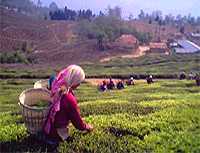
Work in tea estates and processing units across Nepal has come to a halt after workers went on strike. The closure has affected some 40,000 persons. Workers' representatives said the strike began after estate owners did not agree to a nominal salary demand.
All Nepal Tea Estate Workers' Association, Nepal Tea Estate Workers' Association and Nepal Independent Tea Workers' Union had been staging protests since August 3 to press the management to meet their 21-point demand.
Workers are demanding the fixing Rs 5,000 ($70 US) as monthly wages of workers, providing Dashain bonus, making the provision of provident fund, providing wages for the duration of their agitation, among others. Other demands include making temporary workers permanent and making provisions for contingency funds, bonuses and medical facilities, reinstating laid off workers, allow 90-day maternity leaves and provide one kilogram of tea to each worker every month.
"We will continue our protest until the demands are met," said Deepak Tamang, a leader of the workers said.
The following is from Kantipur Reports.
Tea workers' strike continues
BIRTAMOD (Jhapa), Aug 17 - Tea workers continued with their strike on Wednesday, bringing tea plucking and processing work in Jhapa, Ilam and Panchthar to a complete halt for the fourth consecutive day.
Trade union of tea workers gathered workers in Kakarbhitta and organized a rally and a mass meeting during the day. The meeting witnessed the participation of a large number of women, who normally constitute the tea plucking force.
The workers have been on a strike demanding fulfillment of their 21-point demand including a rise in monthly salary, perks and also payment of wages for the 21-day closure during the General Strike.
They took to the streets after the failure of the three-day talks held between the tea producers and trade unions.
Meanwhile, tea producers have moved to the Capital to bring the problem to the government's notice and request the government to intervene. They claim that the producers simply cannot fulfill the workers' demands.
“We cannot fulfill the demand on price hike, among others. Instead, we are ready to quit the business,” Chhatra Giri, president of Nepal Tea Producers Association (NTPA) said a few days ago.
To this, Dipak Tamang, president of Tea Estate Workers Association (TEWA), responded that tea workers were capable of running the business, if the producers were ready to quit. “We can show them how the tea industry can be run successfully,” said he.
A three-member delegation of the TEWA, meanwhile, met Prime Minister Girija Prasad Koirala in Biratnagar and apprised him of the problems in the tea sector. “The PM has assured us that he will discuss the matter with the concerned Ministry and producers, and take steps to resolve our problems,” Tamang said.
Meanwhile, our Ilam-based correspondent reports that the ongoing strike has affected thousands of small tea farmers, as they have not been able to sell their leaves to factories.
As the leaves wilt rapidly, farmers are suffering a cumulative loss running into millions of rupees every day.
The farmers have also asked the trade unions and producers to end their stalemate and resume operations soon. Otherwise, they have warned, they would launch a strike of their own.
“The factories should resume operations, for this is a major season of tea production. Otherwise, we will also go on strike,” said Tanka Mani Koirala, vice-president of Eastern Small Tea Farmers Association (ESTFA).
Farmers in Ilam also constituted a pressure group under the coordination of Dipak Adhikari on Wednesday to create an environment to enable early resumption of factories' operations.
“Strike has taken place during the main plucking season. This has seriously hurt small farmers, who not only anchor their livelihood on the production, but also rely on the earning from the green leaves to clear their bank loans,” said Dambar Katuwal, a tea farmer of Ilam.
According to statistics of Tea Producers Association, some 30,000 farmers are currently involved in tea plantation in districts such as Jhapa, Ilam, Panchthar, Tehrathum and Dhankuta, and they supply millions of kgs of green leaves to tea processors everyday.
No comments:
Post a Comment